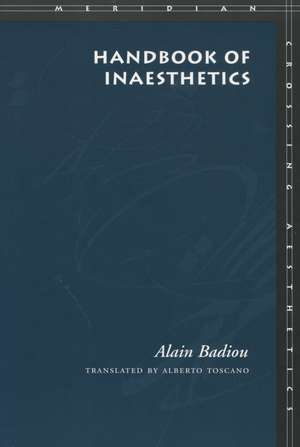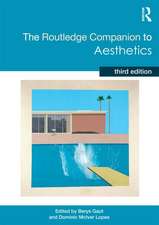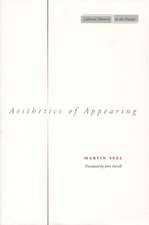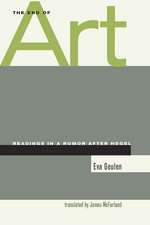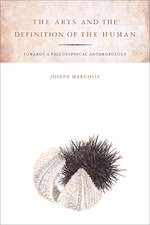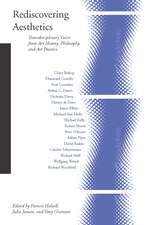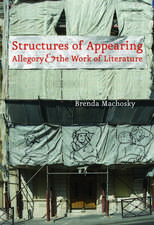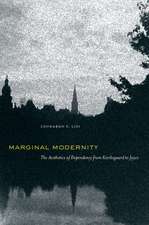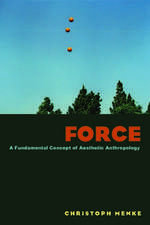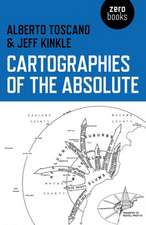Handbook of Inaesthetics: Meridian: Crossing Aesthetics
Autor Alain Badiou Traducere de Alberto Toscanoen Limba Engleză Hardback – 27 oct 2004
Didacticism, romanticism, and classicism are the possible schemata for the knotting of art and philosophy, the third term in this knot being the education of subjects, youth in particular. What characterizes the century that has just come to a close is that, while it underwent the saturation of these three schemata, it failed to introduce a new one. Today, this predicament tends to produce a kind of unknotting of terms, a desperate dis-relation between art and philosophy, together with the pure and simple collapse of what circulated between them: the theme of education.
Whence the thesis of which this book is nothing but a series of variations: faced with such a situation of saturation and closure, we must attempt to propose a new schema, a fourth type of knot between philosophy and art.
Among these “inaesthetic” variations, the reader will encounter a sustained debate with contemporary philosophical uses of the poem, bold articulations of the specificity and prospects of theater, cinema, and dance, along with subtle and provocative readings of Fernando Pessoa, Stéphane Mallarmé, and Samuel Beckett.
Whence the thesis of which this book is nothing but a series of variations: faced with such a situation of saturation and closure, we must attempt to propose a new schema, a fourth type of knot between philosophy and art.
Among these “inaesthetic” variations, the reader will encounter a sustained debate with contemporary philosophical uses of the poem, bold articulations of the specificity and prospects of theater, cinema, and dance, along with subtle and provocative readings of Fernando Pessoa, Stéphane Mallarmé, and Samuel Beckett.
| Toate formatele și edițiile | Preț | Express |
|---|---|---|
| Paperback (1) | 154.20 lei 3-5 săpt. | |
| Stanford University Press – 18 oct 2004 | 154.20 lei 3-5 săpt. | |
| Hardback (1) | 612.12 lei 6-8 săpt. | |
| Stanford University Press – 27 oct 2004 | 612.12 lei 6-8 săpt. |
Din seria Meridian: Crossing Aesthetics
-
 Preț: 78.35 lei
Preț: 78.35 lei -
 Preț: 227.94 lei
Preț: 227.94 lei -
 Preț: 232.81 lei
Preț: 232.81 lei -
 Preț: 226.40 lei
Preț: 226.40 lei -
 Preț: 164.45 lei
Preț: 164.45 lei -
 Preț: 271.73 lei
Preț: 271.73 lei -
 Preț: 249.82 lei
Preț: 249.82 lei -
 Preț: 279.44 lei
Preț: 279.44 lei -
 Preț: 199.10 lei
Preț: 199.10 lei -
 Preț: 258.64 lei
Preț: 258.64 lei -
 Preț: 149.49 lei
Preț: 149.49 lei -
 Preț: 231.67 lei
Preț: 231.67 lei -
 Preț: 142.73 lei
Preț: 142.73 lei -
 Preț: 172.13 lei
Preț: 172.13 lei -
 Preț: 146.40 lei
Preț: 146.40 lei -
 Preț: 139.64 lei
Preț: 139.64 lei -
 Preț: 228.39 lei
Preț: 228.39 lei -
 Preț: 138.82 lei
Preț: 138.82 lei -
 Preț: 227.71 lei
Preț: 227.71 lei -
 Preț: 148.45 lei
Preț: 148.45 lei -
 Preț: 127.27 lei
Preț: 127.27 lei -
 Preț: 224.41 lei
Preț: 224.41 lei -
 Preț: 139.42 lei
Preț: 139.42 lei -
 Preț: 210.00 lei
Preț: 210.00 lei -
 Preț: 203.47 lei
Preț: 203.47 lei -
 Preț: 154.20 lei
Preț: 154.20 lei -
 Preț: 159.75 lei
Preț: 159.75 lei -
 Preț: 224.41 lei
Preț: 224.41 lei -
 Preț: 149.68 lei
Preț: 149.68 lei -
 Preț: 196.44 lei
Preț: 196.44 lei -
 Preț: 210.00 lei
Preț: 210.00 lei -
 Preț: 111.58 lei
Preț: 111.58 lei -
 Preț: 168.96 lei
Preț: 168.96 lei -
 Preț: 250.69 lei
Preț: 250.69 lei -
 Preț: 172.95 lei
Preț: 172.95 lei -
 Preț: 138.60 lei
Preț: 138.60 lei -
 Preț: 147.22 lei
Preț: 147.22 lei -
 Preț: 150.72 lei
Preț: 150.72 lei -
 Preț: 141.28 lei
Preț: 141.28 lei -
 Preț: 216.48 lei
Preț: 216.48 lei -
 Preț: 252.92 lei
Preț: 252.92 lei -
 Preț: 191.39 lei
Preț: 191.39 lei -
 Preț: 227.27 lei
Preț: 227.27 lei -
 Preț: 169.42 lei
Preț: 169.42 lei -
 Preț: 147.85 lei
Preț: 147.85 lei -
 Preț: 204.32 lei
Preț: 204.32 lei -
 Preț: 150.72 lei
Preț: 150.72 lei -
 Preț: 207.82 lei
Preț: 207.82 lei -
 Preț: 162.67 lei
Preț: 162.67 lei
Preț: 612.12 lei
Preț vechi: 755.71 lei
-19% Nou
Puncte Express: 918
Preț estimativ în valută:
117.13€ • 125.25$ • 97.66£
117.13€ • 125.25$ • 97.66£
Carte tipărită la comandă
Livrare economică 18 aprilie-02 mai
Preluare comenzi: 021 569.72.76
Specificații
ISBN-13: 9780804744089
ISBN-10: 0804744084
Pagini: 168
Dimensiuni: 152 x 229 x 15 mm
Greutate: 0.34 kg
Ediția:1
Editura: Stanford University Press
Colecția Stanford University Press
Seria Meridian: Crossing Aesthetics
ISBN-10: 0804744084
Pagini: 168
Dimensiuni: 152 x 229 x 15 mm
Greutate: 0.34 kg
Ediția:1
Editura: Stanford University Press
Colecția Stanford University Press
Seria Meridian: Crossing Aesthetics
Notă biografică
Alain Badiou holds the Chair of Philosophy at the École Normale Supériere in Paris. Many of his books have been translated into English, including Saint Paul: The Foundation of Universalism (Stanford, 2003), Manifesto for Philosophy (1999), and Deleuze: The Clamor of Being (1999).
Descriere
This volume presents a new proposal for the link between philosophy and art. Badiou identifies and rejects the three schemes of didacticism, romanticism, and classicism that he sees as having governed traditional "aesthetics," and seeks a fourth mode of accounting for the educative value of works of art.
